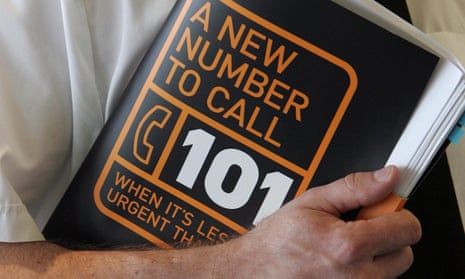A senior police officer has said publicly that people who call the police on 101 for non-emergencies could be wasting their time, reflecting considerable public dissatisfaction with the service.
Insp Matt Johnson, of Cambridgeshire’s safer neighbourhood scheme, made the remark at a meeting with councillors last week in response to complaints about Cambridgeshire police’s slow response to 101 calls.
“Historically I’ve said call 101, but life’s too short. I’m not supposed to say that, sorry,” he said, as reported by the Cambridge News.
The 101 number – in contrast to 999 – is for contacting the police in non-emergencies such as car theft, property damage or suspected drug use in a neighbourhood. It is supposed to take pressure off the emergency services.
Johnson was responding to complaints from the leader of Cambridge city council, Lewis Herbert, who told the police and crime panel that even council officers had given up on attempts to report crime via 101.
Herbert said Sir Graham Bright, Cambridgeshire’s police and crime commissioner, knew about the problem a year ago and that he “doesn’t deserve” to be the commissioner if he could not sort it out.
“What is failing is the whole system but clearly, because the system is failing, the job of being in central control is so unattractive, so stressful, that they can’t retain the staff,” said Herbert. “The people who need to record and follow up these incidents are not answering the phone – it is too stressful at the centre.”
Cambridgeshire police said it was recruiting staff to deal with the high volume of 101 calls.
Det Supt Andy Gipp said: “The context in which Insp Johnson made the comments was in respect of reporting minor issues to the constabulary which didn’t present any risk to people or have a time imperative. The constabulary continues to provide the best service it can even when the demand for the 101 service is, at times, extraordinarily high. We recognise that people do need to wait at peak times and we continue to work to reduce these.”
The 101 number came into widespread use across England and Wales in 2011 after being piloted by several forces, replacing the seven-digit numbers used to contact different police forces in non-emergency situations, of which many people were unaware. Instead, by dialling 101 from anywhere in the country, the caller goes through to a call centre that connects them to the force they need.
Freedom of Information data obtained by the BBC last year showed that from October 2013 to September 2014 there were 1.07m dropped or abandoned calls to the 33 forces providing such data. This was a rise of more than 26% on the previous 12 months, even though there were more than 100,000 fewer calls.
The figures also showed few forces were achieving their own internal targets of answering 90% of calls within 30 seconds. By this measure, the poorest-performing force was Surrey police, where 66.8% of calls were answered within 30 seconds, and the best-performing force was Merseyside police, which answered 97% of calls within 30 seconds.
South Yorkshire has just completed a review of its 101 service after it emerged that callers to the Atlas Court communications centre in Sheffield were left waiting 40 minutes to get an answer in some cases.

Comments (…)
Sign in or create your Guardian account to join the discussion